Symposium objectives
The symposium aims to promote international collaboration among academics, researchers, industry experts, and key stakeholders to generate innovative, interdisciplinary ideas and research solutions. These insights will support the development, testing, and implementation of advanced systems-based management approaches, sustainable technologies, and data-driven innovations. The symposium focuses on reducing environmental impact, supporting climate change mitigation and adaptation strategies, and advancing sustainable agricultural production and environmental sustainability. It highlights the critical role of research, technology, and policy integration in addressing global climate challenges and promoting resilient, sustainable agri-food systems. Key themes and focus areas include:
- Developing comprehensive, integrated, and holistic environmental solutions that address complex environmental challenges by considering ecosystem interconnections, systems thinking, and sustainable environmental management strategies.
- Promoting ecological resilience, strengthening ecosystem services, and enhancing long-term sustainability through agro-biodiversity conservation, natural resource protection, climate-resilient agriculture, and sustainable farming systems capable of adapting to climate change and environmental pressures.
- Establishing advanced decision-support systems and data-driven frameworks to support informed decision-making in sustainable land use planning, environmental policy, and climate-smart agricultural management aligned with global sustainability goals.
- Identifying economically viable, socially inclusive, and environmentally sustainable solutions aligned with the circular bioeconomy, prioritising innovative approaches that deliver environmental benefits while addressing stakeholder needs, policy relevance, and sustainable development objectives.
- Advancing interdisciplinary research and innovation to support evidence-based policy development, effective implementation strategies, and scalable solutions for climate change mitigation, climate adaptation, environmental sustainability, and sustainable agri-food systems.
By addressing these critical environmental and agricultural challenges, the symposium seeks to explore and develop innovative, science-based strategies that balance the reduction of environmental footprints with the advancement of sustainable agricultural systems. In the context of climate change mitigation and adaptation, the event aims to generate actionable insights, evidence-based solutions, and policy-relevant outcomes that support environmental sustainability, climate-resilient farming, and sustainable agri-food systems at local and global levels.
Themes include:
- Arable Cropping Systems
- Grassland Systems
- Agro-Forestry Systems
- Regenerative Agro-Farming
- Nature-based Solutions in Agriculture
- Novel Agro-Farming Systems
- Automation of Agro-Farming
- Biogeochemical Processes in Agro-Farming
- Decision Support Systems in Agro-Farming
- Circular Bioeconomy in Agro-farming
- Biodiversity in Agricultural Systems
- Climate Change and Agro-farming Policy
Arable Cropping Systems
Globally, arable cropping systems are influenced by climate variability, land use patterns, and agroecological conditions, including dryland, upland, and wetland farming environments. These factors drive diverse cropping systems such as cereal monocropping, cereal–legume rotations, and mixed crop production. Tillage-intensive arable agriculture remains one of the most widespread land management practices, significantly affecting soil quality, soil carbon, environmental sustainability, and ecosystem services, while also contributing to soil degradation, environmental impact, and ecological decline in agricultural landscapes.

Land use, soil types, and farming practices, including fertilizer application and organic residue management, play a critical role in greenhouse gas emissions, air quality, nutrient leaching, and environmental sustainability. Unsustainable cultivation methods and excessive agrochemical use can accelerate soil erosion, biodiversity loss, pollution, and soil degradation. This session focuses on research into sustainable arable cropping systems and innovative solutions to mitigate air, water, and soil pollution through improved land management and climate-smart agricultural practices.
Back to top
Grassland Systems
Grasslands, including pasture, hay, and silage systems, account for a major proportion of global agricultural land and play a critical role in livestock production, sustainable agriculture, and environmental management. Livestock grazing on pastures and meadows is strongly influenced by grazing intensity and nutrient management practices, including the use of organic and inorganic fertilizers, which affect soil health, productivity, and ecosystem sustainability. However, intensive grassland and livestock systems contribute significantly to greenhouse gas (GHG) emissions and environmental pollution, including ammonia (NH₃), nitrogen oxides (NOₓ), non-methane volatile organic compounds (NMVOCs), particulate matter, and nutrient losses such as nitrate (NO₃⁻) and phosphate (PO₄³⁻) through leaching, volatilisation, and runoff. The livestock sector is a major source of anthropogenic methane emissions, particularly from enteric fermentation and manure decomposition, and projected increases in global livestock numbers are expected to raise manure production by approximately 60% by 2030, further intensifying methane emissions, climate change impacts, and environmental pressures, highlighting the urgent need for sustainable grassland management, climate-smart livestock systems, and effective emission mitigation strategies.
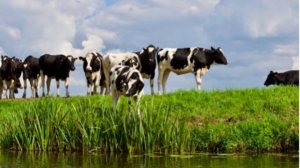
These environmental pressures highlight the urgent need for sustainable grassland management practices that consider livestock density, fertilizer type and application rates, climate variability, resource availability, and ecosystem and biodiversity services. Effective management of grazed and ungrazed grassland systems is essential to reduce greenhouse gas emissions, nutrient losses, and environmental pollution while enhancing soil health, ecosystem resilience, and long-term agricultural sustainability. This session will focus on innovative, science-based solutions to mitigate coupled air, water, and soil pollution in grassland and livestock systems, promoting climate-smart agriculture, sustainable land management, and environmentally sustainable farming practices.
Back to top
Agro-Forestry Systems
Mixed farming systems are very popular in both developed and developing nations, and are generally divided into four systems (i) Agro-pastoral system (arable ley), (ii) Agro-Forestry system, (ii) Silvo-pastoral system, and (iv) Agro-Silvo-Pastoral system. Other than agro-forestry, livestock (cattle, sheep and goats) grazing is common in mixed farming systems. The number of agro-silvo systems associated particularly with beef/meat and dairy production has been increasing globally. In these mixed systems, as in grassland, application of organic and inorganic fertilizers to improve crop/biomass production may increase GHG emissions and environmental pollution. Yet, these systems are thought to increase the use of crop by-products resulting in improved nutrient recycling and reduced methane production.
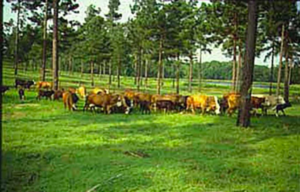
Accordingly, mixed farming as an approach to satisfy the global demand for food, meat and milk could have some advantages in reducing the environmental and carbon footprints. However, applied research and extension are of critical importance if the environmentally friendly factors of the system are to be adequately exploited. Considering the fundamental change and integration of livestock as a mechanism to promote system flexibility, identification of technologies and policies for simultaneous reduction of GHGs and environmental pollution will be the main focus of this session.
Back to top
Regenerative Agro-Farming
Regenerative agro-farming focuses to reduce the environmental impacts of agricultural practices, including livestock with a social dimension, and achieve greater productivity, resilience, and profitability while enhancing biodiversity, improving soil and ecosystem health, and reducing greenhouse gas emissions. The associated management interventions for example are to create a more resilient and diverse agricultural ecosystem that can better cope with the challenges of climate change, public health, and food security. It requires different approaches to management than traditional agriculture.
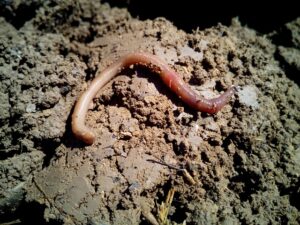
Some specific examples of the specific management interventions include (i) Conservation Tillage that reduces or eliminates practices that can degrade soil health, such as ploughing and disking aiming to increased soil organic matter, improved water retention, and reduced erosion, (ii) Intercropping diversified Cropping Systems and Cover Cropping that specifically improves soil health and nutrient cycling, reduces pest pressure and erosion, increases soil organic matter and biodiversity and improves water infiltration, (iii) Reduced Chemical Inputs that lessen the use of synthetic chemicals (e.g. fertilizers and pesticides), instead rely on natural processes to support crop growth and protect against pests, (iv) Integrated Pest Management that includes a combination of cultural, biological, and chemical methods to manage pests and reduce the need for synthetic pesticides, (v) Livestock Integration that improves soil health and reduces greenhouse gas emissions by using manure as a natural fertilizer and controlling weeds, and (vi) Holistic Management as an approach to farming that involves the entire farm ecosystem when making decisions about land use and management to improve soil health, reduce greenhouse gas emissions, and increase profitability. This session will focus on the fundamental and applied management interventions to reduce various footprints to achieve climate-resilient agri-environmental systems and circularity.
Back to top
Nature-based Solutions in Agriculture
Nature-based Farming Solutions (NBFS) are actions that protect, sustainably manage, and restore natural or modified ecosystems and are likely to have the greatest potential impacts on adaptation and resilience-building. These measures encompass agroforestry, improved land (crop, grass and peat) management, agricultural diversification, integrated water use, and forest management. They take into consideration both traditional and local knowledge as well as scientific evidence to support the optimum use of natural resources for agricultural production, whilst also maintaining or even enhancing native biodiversity. The approaches associated with NBFS include the adoption/promotion of organic agriculture, agroecological approaches, and conservation farming with the objective of reducing the environmental footprint of farming activities.
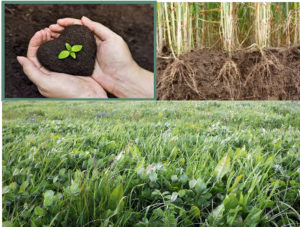
An emerging approach, directed at these objectives is the use of perennial crops, which have the potential of ensuring the greater capture and conservation of resources through photosynthesis, and improvements in nutrient recycling. A range of alternative management practices, such as mixed cropping, can potentially derive considerable benefits from the integration of perennials, as opposed to traditional seasonal crops. There are six evidence-based ecological principles proposed for the design and implementation of an effective NBFS, including a reduction in biodiversity loss, delivery of location-specific ecosystem services, the use of targeted interventions, strengthening links between people, producers, and nature, and longer-term flexible planning. Hence, this session is centred on Carbon Farming and Nature-based Solutions. The focus will be on how to increase carbon storage, improve/maintain water quality, soil health, biodiversity, and the role of pollinators. Novel pest control methods that have climate, water quality, and nature-related benefits, will also be examined, that minimise carbon loss and contribute to improved farm livelihoods.
Back to top
Novel Agro-Farming Systems
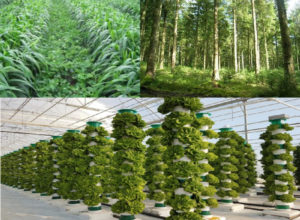
Concerns about the environmental footprint and sustainability of current industrial farming practices have resulted in an increased interest in novel farming systems (NFS). Essentially these systems are focused on the growth of crops in places and under conditions that have not traditionally been regarded for agricultural production. This could provide an attractive solution to many of the environmental concerns, including those related to water and energy consumption greenhouse gas (GHG) emissions and environmental pollution, including circular bio-economy approaches. Many of these approaches have the added advantage of maximising the use of available space, and limiting resources (e.g. light, soil, and water). The NFS includes:
- Indoor farms are generally based on the up scaling of horticultural facilities using hi-tech greenhouses (e.g. vertical farming), insulated indoor spaces like warehouses and shipping containers, and hydroponics under controlled environmental conditions. These are being currently used to grow food closer to consumers, and drastically reduce the inputs necessary for outdoor agriculture as a few key ingredients (e.g. light, water, and nutrition) are required.
- Insect-Worm farm have been identified as an increasingly important alternative protein source for both animals and humans and a more sustainable alternative to high quality animal protein. These could substitute for wild-caught fish to counter overfishing, and include crickets, fruit flies, grasshoppers, and mealworms.
- Aquaculture is a long-standing industry with enormous potential to produce edible protein from seafood and sea vegetables, including algae and plants not traditionally used as crops (e.g. azolla and duckweed). This includes fish farming along with oysters, scallops, shrimp, mussels, and other shelled organisms. Algal farming represents an underdeveloped sector within NFS but with great market potential and most single-celled microalgae must be grown in a controlled setting. This includes aquaponics where vegetables or other crops are integrated with fish farming, so that the waste generated by the fish can be used to fertilize plants.
- Microbes are used for the production of microbial protein mainly in the brewing industry and have the potential for a diverse range of applications in the food and beverage industries. Cultured yeasts or bacteria can also be used in the flavour, fragrance, and food industries substituting for natural alternatives. What is unclear, however, is what overall impact NFS have on the environment and resource availability and to what extent they contribute to a reduction in GHG emissions as this has received little attention. This including circular bio-economy will be the main focus of this session.
Back to top
Automation of Agro-Farming
Automation in agricultural farming refers to the process of using advanced technologies and machinery to alleviate the labour-intensive and time-consuming operations while tracking, monitoring, automating, and analysing practices to implement. The goal of automation in agriculture is to improve efficiency, reduce labour costs, and increase productivity. It can play a key role in ensuring food security for an increasing global population while reducing greenhouse gas emissions, nutrient losses, and the carbon footprint of agriculture in several ways. These will depend on the specific practices and technologies used, and on factors such as land-use change, soil management, and food waste reduction.
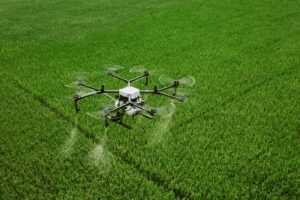
Some examples of agricultural automation include (i) PrecisionAgriculture refers to the use of advanced technology (e.g. sensors and drones) to manage specific parts of a farm based on individual needs such as optimization of fertilizer and pesticide use, (ii) Autonomous Tractors are using sensors and GPS technology to perform tasks such as planting, tilling, and harvesting crops without human intervention, (iii) Irrigation Automation with sensors monitors soil moisture levels and adjust the amount of water applied to crops accordingly to reduce water waste and improve water efficiency, (iv) Livestock Monitoring with sensors and technology tracks the health and behaviour of animals, and alert farmers when intervention is needed in reducing emissions from enteric fermentation and manure management, (v) Greenhouse Automation with technology controls temperature, humidity, and light levels to optimise crop growth while reducing energy use. The focus of this session will be on new advancements in technologies ranging from sensors, robotics, and drones to computer vision software that have completely transformed modern climate-resilient agriculture.
Back to top
Biogeochemical Processes in Agro-Farming
Agricultural farming systems are complex ecosystems that involve a variety of biogeochemical processes including physical, chemical, and biological. Biogeochemical processes are the underlying mechanisms that govern the cycling of essential elements, such as carbon, nitrogen, phosphorus, and water, within the agricultural ecosystem. By understanding these processes, farmers can make informed decisions on the optimisation of fertilizers application, reduce the risk of nutrient losses in waterbodies, and minimize greenhouse gas emissions while improving soil health, increasing crop yields, and ensuring sustainable food production.
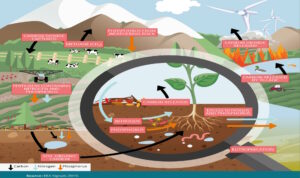
Some of the key biogeochemical processes occurring in agricultural farming systems include: (i) Soil Organic Matter Decomposition: Soil organic matter is decomposed by microbes, which release nutrients and carbon dioxide back into the soil and the major driving factors are temperature, moisture, and the presence of organic matter, (ii) Nitrogen Cycling: Nitrogen is an essential nutrient for plant growth and is involved in a complex cycle of transformation and transformation within agricultural systems including plant uptake or lost to the atmosphere through processes such as volatilization, nitrification or denitrification, causing global warming, (iii) Phosphorus Cycling: Phosphorus is another essential nutrient for plant growth and is involved in a cycling process within agricultural systems including its lost from the soil through processes such as erosion or leaching, responsible for eutrophication, (iii) Carbon Cycling: Carbon is a critical component of the global carbon cycle and is involved in a complex series of processes within agricultural systems to enhance C storage, improve soil health and productivity and offset greenhouse gases, or release back into the atmosphere through processes such as respiration or combustion, showing as a C source, (iv) Water Cycling: Water is an essential resource for agriculture and is involved in a complex cycling process within agricultural systems including facilitating plant nutrient uptake, stored in the soil, or lost through processes such as evaporation or runoff. This session will centre on fundamental aspects of biogeochemical processes occurring in the agricultural systems linking to C, N, P, and others as well as identify the driving variables and the research gaps.
Back to top
Decision Support Systems in Agro-Farming
Limited field measurements and Excel-based national inventory methods (IPCC Tiers), focussed mainly on the developed nations, are being used for accounting, and form the basis for mitigating the environmental consequences of GHGs, air pollutants, and leaching losses. However, these approaches often struggle with an adequate assessment of the impact of agricultural management practices particularly mixed farming systems. There are substantial difficulties in incorporating any mitigation strategies and are unable to provide immediate feedback on the consequences of management actions/decisions. As measurements covering all ecosystems and soils are not feasible, the use of model-based decision-support tools could be an alternative option in order to cover diverse agricultural systems.

Any verified and validated model should be used as a decision support tool to provide assessments at a unit level but applicable to the regional scale. This would help raise local awareness, provide prospects for actions, aid in refining and implementing emission mitigation techniques, and demonstrate the effects of innovative actions. A further benefit is that they can help to identify environmental hotspots, evaluate indicators of sustainability provide alternative management scenarios, identify practices having a positive impact on net GHG emissions and the environment and provide options for assessment of the economic effects of interventions at all scales. This will be the topic of this session.
Back to top
Biodiversity in Agricultural Systems
Introducing an engaging theme content on Biodiversity in Agricultural Systems that covers the variety and variability of animals, plants, and microorganisms. This session explores the critical role of biodiversity in sustainable and resilient agricultural landscapes.

Join us to uncover the profound importance of biodiversity for food production, ecosystem services, and climate resilience. Expert speakers will share valuable insights on enhancing biodiversity in agricultural systems, including soil biodiversity, pollinators, and beneficial insects, as well as agroforestry and cover crops. Discover innovative practices that nurture biodiversity, enhance soil health, and protect natural habitats. Explore case studies highlighting successful implementations and their positive impacts on crop productivity, pest control, and ecosystem balance.
Let’s embrace the vital connection between biodiversity and sustainable agriculture, shaping a future where agricultural systems thrive in harmony with nature.
Back to top
Climate Change and Agro-farming Policy
Climate change and agro-farming policy play important roles in the mitigation of greenhouse gases and nutrient losses for environmental protection. Climate change has a direct impact on agriculture, causing changes in temperature and precipitation patterns that can affect crop production and soil health. However, agriculture can also contribute to climate change through the production of greenhouse gases. To mitigate the impact of climate change, it is important to formulate policies and adopt practices that promote soil health, increase carbon sequestration, and reduce the use of synthetic chemicals. Agro-farming policy could promote sustainable practices and incentivize farmers or penalize them to reduce the impact of agriculture on the environment and promote sustainable food production.
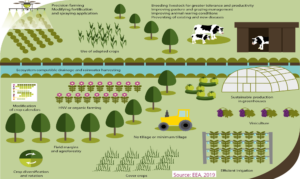
To do so, several policies linking to improve soil health, reduce greenhouse gas emissions, and increase resilience of agricultural systems to the impacts of climate change can be taken, including (i) Promotion of Sustainable Agricultural Practices (e.g. regenerative agriculture, conservation tillage, and the use of cover crops), (ii) Financial Incentives (e.g. tax credits, grants, and low-interest loans to offset the costs of transitioning to more sustainable practices and encourage widespread adoption,) (iii) Encourage Reduction of Synthetic Chemical Use and measures (integrated pest management practices), to rely on natural methods of pest control, (iv) Implementation of Carbon Sequestration Programmes that incentivize farmers to sequester carbon in the soil, improve ecosystem services, and technical assistance to farmers who want to adopt sustainable practices, (v) Research and Development Investment in Climate-resilient Agriculture (e.g. new crop and livestock verities and efficient irrigation system), (vi) Encouragement of Agroforestry to provide additional benefits such as reducing erosion, improving water quality, and providing habitat for wildlife. This session will inform evidence-based policy and decision-making on economically viable management interventions for climate change mitigation and adaptation as well as environmental pollution reduction without compromising agricultural production emphasising food security.
